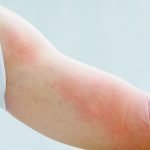Could Women’s Hygiene Products be a Source of Toxic Chemicals in Blood?
Node Smith, ND
Women who use a vaginal douche could be at a higher risk of exposure to potentially dangerous chemicals, according to a University of Michigan study that looked at the correlation between the use of female hygiene products and the levels of volatile organic compounds in women’s blood.
Study found a significant association between vaginal douching and higher blood concentrations of 1,4-dichlorobenzene
The study found a significant association between vaginal douching and higher blood concentrations of 1,4-dichlorobenzene, a volatile organic compound. Because black women in the study reported significantly more use of vaginal douching, researchers believe they could be at higher risk of exposure to the chemicals and their negative effects.
According to the study
According to the study, women who used a vaginal douche two or more times per month had concentrations 81% higher than those that never used. Women who used douches occasionally (once a month) had 18% higher concentrations of the chemical.
VOCs are chemicals that are used in a wide-range of products including deodorants, nail polish and paints. Some of these chemicals have been associated with respiratory symptoms, cancers and neurological disorders, as well as adverse effects in reproductive systems.
Additional studies are needed
While additional studies are needed, women would be better off heeding the recommendation from the American Society for Obstetricians and Gynecologist to not to use certain products, said Ning Ding, a doctoral candidate in epidemiology at U-M’s School of Public Health and lead author of the study.
“While they are more concerned about disrupting the balance of bacteria in the genital area or interrupt the pH level, they have not focused on the toxicity of those endocrine disrupting chemicals, which is really important and need to be highlighted,” said Ding, pointing out that 20-40% of women use this kind of product in the U.S. “I would recommend women not to douche.”
Study uses data from a representative sample of 2,432 women aged 20-49
The study, published online in the Journal of Women’s Health, uses data from a representative sample of 2,432 women aged 20-49 from the National Health and Nutrition Examination Survey 2001-2004. Participants were asked about their use of feminine products including tampons, sanitary napkins (pads), vaginal douches, sprays, powders and wipes/towelettes.
Researchers used regression models to estimate percentage changes in concentration of VOCs in blood to establish whether a dose-response relationship existed. Among the chemicals analyzed were eight VOCs: bromoform, bromodichloromethane, benzene, chloroform, dibromochloromethane, 1,4-dichlorobenzene (DCB) and ethylbenzene.
Feminine powder also significantly associated with higher concentrations of ethylbenzene
In addition to the relationship between douching and DCB levels, researchers found that the use of feminine powder in the past month was significantly associated with higher concentrations of ethylbenzene.
A follow-up study is now being conducted
Researchers said they are conducting a follow-up study looking at more than 100 feminine hygiene products used by women and are following 30 women through a menstruation cycle to determine if there is a correlation between the use of the products and levels of VOCs in their urine.
Sung Kyun Park, associate professor of epidemiology and environmental health sciences, was senior investigator of the study. In addition to Ding and Park, authors included Stuart Batterman, professor of environmental health sciences at U-M’s School of Public Health.
The study was funded the National Institute of Environmental Health Sciences (P30-ES017885) and the Centers for Disease Control and Prevention/National Institute for Occupational Safety and Health Grant (T42- OH008455).
1. From University of Michigan; Ning Ding, Stuart Batterman, and Sung Kyun Park. Exposure to volatile organic compounds and use of feminine hygiene products among reproductive-aged women in the United States. 18 Sep 2019https://doi.org/10.1089/jwh.2019.7785. https://www.liebertpub.com/doi/10.1089/jwh.2019.7785

Node Smith, ND, is a naturopathic physician in Humboldt, Saskatchewan and associate editor and continuing education director for NDNR. His mission is serving relationships that support the process of transformation, and that ultimately lead to healthier people, businesses and communities. His primary therapeutic tools include counselling, homeopathy, diet and the use of cold water combined with exercise. Node considers health to be a reflection of the relationships a person or a business has with themselves, with God and with those around them. In order to cure disease and to heal, these relationships must be specifically considered. Node has worked intimately with many groups and organizations within the naturopathic profession, and helped found the non-profit, Association for Naturopathic Revitalization (ANR), which works to promote and facilitate experiential education in vitalism.










